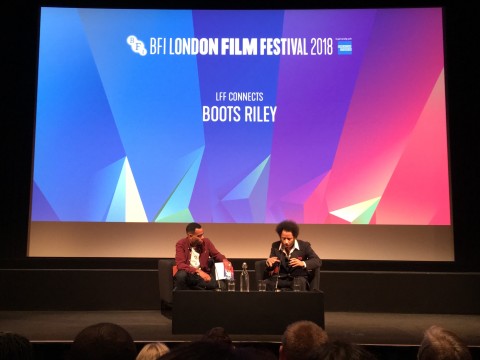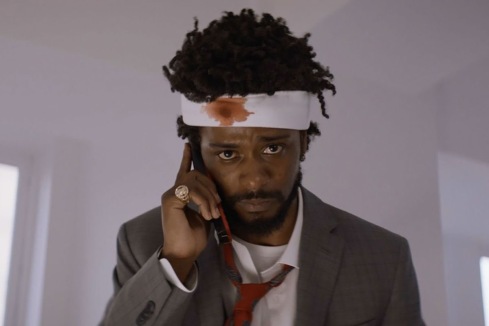Until Sorry to Bother You was released in the USA last July, first-time director Boots Riley was best known as the leader of hip-hop band The Coup. However, his new satire on politics and race had a long gestation.
Set in Oakland, the film follows Cassius ‘Cash’ Green (Lakeith Stanfield, Get Out, Straight Outta Compton), a young black man who lives with his activist/artist girlfriend Detroit (Tessa Thompson, Annihilation) in Cash’s uncle’s garage. Struggling to make ends meet, Cash gets a tele-sales job in a call centre for a company called RegalView, working alongside his friend Sal. When one of his colleagues (Danny Glover) shows him how to use his ‘white voice’, to expresses confidence and success, his sales rates rocket and his managers are impressed. Although Detroit finds fulfillment in her art, Cash yearns for something to define himself and he sets his sights on corporate success. He longs to be promoted to ‘power seller’.

In the meantime, Cash’s co-worker Squeeze is secretly organising a strike for more pay. Cash is sympathetic, but is torn between loyalty to his colleagues and his own personal ambitions. This causes friction with girlfriend Detroit. Cash chooses to climb the corporate ladder and his ethics are challenged by the lure of money and success, particularly as he discovers what RegalView is really involved in.
The film is set in a world where corporations are increasingly using workers as pseudo slaves. We see ads for a company called WorryFree, where workers sign a lifetime contract of manual labour in return for guaranteed free food and lodgings. Workers volunteer to join WorryFree, but mostly as a last choice; regular jobs are scarce and don’t pay well. A activist group called ‘The Left Eye’ (the name a nod from Riley to Lisa Lopes), protests against WorryFree and vandalises their advertisments.
I won’t spoil the direction the plot moves in, save to say that it gets increasingly satirical and covers a lot of ground.

As well as attending the UK premiere at the London Film Festival, I also heard Boots Riley give an extended interview where he touched about the film’s genesis. It had a long history.
Riley originally wrote the script in 2012. However, although he had been involved in a range of activities he was primarily known for his music and he discovered that ‘nobody wants to read a script by a musician’. He took an unorthodox approach to getting his script noticed.
First he recorded what he intended to be the soundtrack album in 2012. This was intended to be a calling card, to tell the world that he had a movie to make.
Then he met author Dave Eggers (A Heartbreaking Work of Staggering Genius, Zeitoun, A Hologram for the King). Eggers was very excited by the script and began telling people it was the best thing he’d read for some time. Eggers founded McSweeneys journal and he published the script in 2014 under that label. Some of Riley’s friends in film had warned him not to publish the entire script, but in Riley’s view having 20,000 copies in circulation by a well respected publisher meant that there was more chance that the right people would read it. One of the things he had learnt from the music business was that there were no rules, you do whatever it takes to get things made.
Eventually Riley got a place on the Sundance scriptwriting lab and then the next year the Sundance directors lab, both of which lent him more credibility and allowed him to make the necessary contacts. It also got him financial grants which allowed him to stop doing gig tours in 2015 and focus solely on the film development. During that period, finances were tight – he was ten months behind in rent at one point and his electricity was cut off for not paying the bills. But it meant that he was able to focus on getting the cast signed up and more importantly securing funding.

The film is full of ideas, and I suspect this is partly because Riley refined and add to the script over several years. In the LFF interview, he noted that didn’t want to make a film based on a single concept. He said it was to be like literature, with lots of themes and developments. ‘Syrupy’, like a novel by Toni Morrison or Gabriel Garcia Marquez.
That does mean the film is less tightly structured than it could be, particularly in the second half. It also means that some plot directions seem under-developed, probably because there’s so much going on in the film. For example, there’s a love triangle thread involving Cash, Detroit and union activist Squeeze that sets up an emotional connection to the workers movement for Cash, as well as an ethical dilemma. However, it just peters out as the main plot goes elsewhere.

Sorry to Bother You feels like two films merged into one, with the second half increasingly fantastic. Although the political themes are consistent, the tone changes from a grounded political satire to a more fanciful direction that reminded me of the anti-capitalist mood of John Carpenter’s They Live in tone if not in detail and that’s no bad thing. The truth is hidden in plain sight.
The film is refreshingly political, with its focus on workers collectivism against capitalist exploitation. The earlier part of the film mercilessly satirises how corporations keep their workers compliant and motivated with carrots and lies. In the call centre ‘we’re not your boss, we’re your friend’, sales are celebrated with empty praise and admiration and there’s always the holy grail of becoming a ‘power seller’. And the film positively depicts workers rebelling against the system, celebrating collectivism and direct action.
Although the film is a comedy, some of the scenes of riot police putting down protests is brutal – I heard audience members wincing at times – and some later scenes where we see an indentured worker beaten for insubordination is grim. Riley is clearly on the side of the activists and he satirically exaggerates worker exploitation to its logical conclusions. It can be subtle as well; in one scene when Detroit is criticising Cash for selling out, he reminders her that although she finds personal fulfillment in her art, in the end she makes her money selling her paintings to rich capitalists.
Riley is a self-professed communist; he was politically active from his mid-teens. He observed that class struggle isn’t normally depicted in American films, despite there being a lot of movies depicting the workplace. But he is heartened that the majority of American youth think that capitalism is broken.
The film is also about race, about a black man choosing to fit into predominantly white society norms. The code-switching ‘white voice’ that Cash first uses to get sales becomes normalised; in power seller circles, it’s ‘white voice’ only. And eventually he increasingly adopts it in his personal life. In one of the scenes most uncomfortable and blackly funny scenes, Cash is coaxed by his white bosses and colleagues to rap for their amusement – he’s black, so he must be able to – and ends up destroying his integrity to reinforce his bosses prejudices.

The ‘white voice’ theme is very similar to Spike Lee’s BlacKkKlansman from earlier this year, although Rileys film has far more bite and integrity. Riley made some significant criticisms of that film, challenging its truthfulness particularly of how it depicted police racism and black activism. Nevertheless, it was interesting to hear that Lee was an early influence on Boots Riley, and Lee’s movies inspired him as a teenager to apply to film school 1989 (he dropped out when his music career blossomed).
Sorry to Bother You is very funny and all the leads are great. It’s energetic and bright in tone. Riley wrote the music which lends the film its upbeat mood. Interestingly, by the time the film was eventually made Riley felt that the soundtrack that he released in 2012 didn’t fit with how the film had evolved and so he wrote a new soundtrack. Consequently there are now two completely different albums, both called ‘Sorry to Bother You’!
There’s a lot of ideas here, but it never feels bogged down. The film is entertaining and engaging, even at its most biting. Yes, it depends on caricatures and sometimes it is a little too heavy handed, but that’s the nature of satire. It has strong points to make on capitalist exploitation and how that intersects with race issues. It achieves this much more effectively than BlacKkKlansman or Get Out, two other films that explored race in an entertaining way but felt a little too straightfoward.
Sorry to Bother You is a lot of fun and has a lot to say. Apparently, the director now has deals for two more films and a TV series, so it looks like we’ll see a lot more of Boots Riley the film maker.

You can watch Boots Riley’s LFF Connect interview in its entirety here:



[…] balanced, crowd-pleasing gem that’s an absolute pleasure. Starring Steven Yeun (Burning, Sorry to Bother You), it’s a semi-autobiographical tale drawn from the director’s own childhood growing up […]
LikeLike